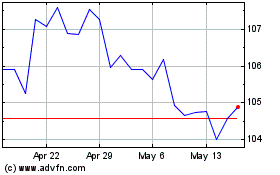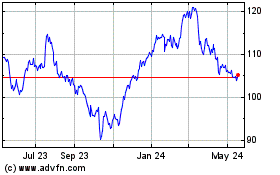UPDATE:Merck Cholesterol Drug Prescriptions Dropped Last Week
25 November 2009 - 7:23AM
Dow Jones News
U.S. prescription volumes for Merck & Co.'s (MRK)
cholesterol drugs Zetia and Vytorin took a hit last week, while
Abbott Laboratories' (ABT) Niaspan got a boost from clinical trial
results that favored Niaspan over Zetia, according to a market
research firm.
Some users of Merck's drugs appeared to be switching to Niaspan,
and Niaspan trends among brand new patients were more favorable
than those for the Merck drugs, according to numbers provided to
Dow Jones Newswires on Tuesday by health-data tracker SDI, of
Plymouth Meeting, Pa.
"There's a lot of switching taking place," said Timothy McGee,
associate director of client solutions and syndicated analytics at
SDI.
Researchers in the Abbott-funded "Arbiter 6" study announced
Nov. 15 at a cardiology conference that Niaspan helped reverse
narrowing of the arteries in heart patients, while Zetia users saw
no significant changes. The data reinforced doubts about the
efficacy of the Merck drugs--doubts that have hurt their sales
since early 2008. Merck has defended the drugs' efficacy and
safety.
The effect of the study on prescription trends was swift,
according to the SDI data. Total U.S. Zetia prescriptions for the
week ended Nov. 20 declined 8.5% from the previous week to about
151,100, while Vytorin was down 5.2% at about 163,600. Vytorin is a
single-pill combination of Zetia and the drug simvastatin.
In contrast, total Niaspan prescriptions last week rose 2.6%
from the previous week to about 107,360, SDI said.
Total U.S. prescription volumes for all cholesterol drugs
contracted 2.6% for the week ended Nov. 20, versus the week before.
Such week-to-week fluctuations are common.
The differences between Niaspan and the Merck drugs were even
more pronounced among two subsets of patients: those who got a
brand new prescription last week and hadn't taken any other
cholesterol drug in the previous 12 months; and those who got a new
prescription last week but had taken a different cholesterol drug
in the previous 12 months.
SDI said these breakdowns of the data can help show whether a
specific event, such as the presentation of new clinical-trial
results, is causing switches among brands for existing patients or
shifting trends among new patients.
Niaspan prescriptions among new patients who hadn't taken any
cholesterol drug in the previous 12 months rose 33.8% from the
previous week, while prescriptions on that basis for Zetia dropped
24% and were down 16.8% for Vytorin. New Niaspan prescriptions
among people who had taken a different cholesterol drug in the
previous 12 months rose 45.6% from the week before, while Zetia
declined 27.4% and Vytorin dropped 23.7% on similar bases.
Merck spokesman Ron Rogers said the company isn't familiar with
the SDI data, and that it would be "premature" to gauge the impact
of the Arbiter 6 study on market trends. He noted that Merck
executives said in October that U.S. prescription market-share
declines for the company's cholesterol drugs appeared to be
stabilizing. He said Merck believes its drugs are valuable
treatment options for helping patients reduce bad cholesterol
levels.
Abbott spokeswoman Laureen Cassidy said the company was
"encouraged" that doctors seem to be recognizing the importance of
going beyond reducing bad cholesterol to treat heart patients.
Niaspan works primarily by raising good cholesterol while Zetia
primarily lowers bad cholesterol.
Abbott's Niaspan sales rose 6.4% to $601 million for the first
nine months of 2009. Merck reported combined Zetia and Vytorin
sales for that period of $3 billion, down 13.8% from a year
earlier.
Merck shares were off 27 cents to $36.15 in recent trading.
Abbott was up $1.29 to $54.42.
-Peter Loftus; Dow Jones Newswires; 215-656-8289;
peter.loftus@dowjones.com
Abbott Laboratories (NYSE:ABT)
Historical Stock Chart
From Mar 2024 to May 2024

Abbott Laboratories (NYSE:ABT)
Historical Stock Chart
From May 2023 to May 2024
